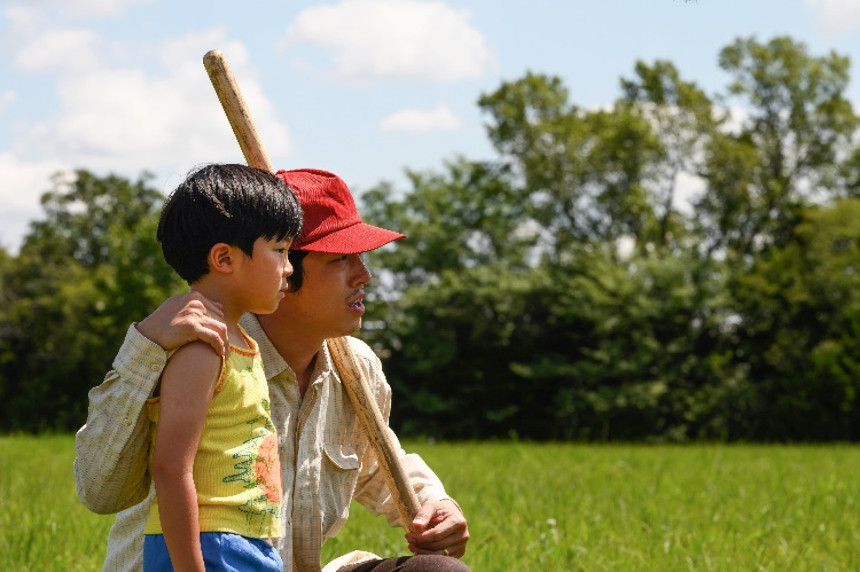Minari
⭐ ⭐ ⭐ ⭐ ⭐
Rating: PG-13
Run Time: 1 hour 55 minutes
Stars: Steven Yeun, Yeri Han, Alan S. Kim, Yuh-jung Youn, Will Patton
Writer/Director: Lee Isaac Chung
In Theaters; Streaming February 26
Sometimes a film is so infused with humanity you could swear you hear its heart beating. And here is Minari—pulsing with love, radiating with hope, coursing with kindness.
It’s the film this country needs right now.
Jacob (Steven Yeun) and Monica (Yeri Han) are recently arrived Korean immigrants trying to make a go of it in 1980s Arkansas. They earn a living sexing chicks at a poultry hatchery — spending eight hours a day sorting through trays of baby chickens, separating the females (which will one day make good eating) from the males (which will not, and so are conferred an early demise).
Despite the fact that he is a first-rate chick sexer, Jacob has a grander vision of his future: He wants to start a farm on which he will raise Korean vegetables for Tulsa’s growing Korean population.
For Jacob in particular, the pull of his native culture is strong, but stronger still is his passion for the American Dream. At times it seems as though Monica and their two young children — a girl named Anne (Noel Cho) and a little boy named David (Alan Kim) — are merely along for the ride as Jacob relentlessly, and perhaps a bit foolishly, invests every last penny of the family’s savings in a failed farm — complete with a worse-for-wear trailer home, a rickety old tractor, and an endlessly cheerful local fellow (Will Patton) to help till the soil.
If hard work alone could ensure success, Jacob would be one of those guys ringing the bell at the New York Stock Exchange. But at nearly every turn, the American Dream seems more like an illusion to him. His well runs dry. Banks won’t lend him money. His lone customer backs out of a deal to sell his produce. Still, Jacob forges on — either ignorant of or ignoring the fact that Monica’s enthusiasm for the entire project is evaporating faster than dew off a field of mung beans.
Adding to the couple’s woes, Monica obsesses over little David, who has a congenital heart condition. Adorably played by Kim — who gives us a few good scares when his little hand reaches for his upper left chest — David is the film’s narrative center. For the most part, we view Jacob and Monica’s life through his eyes, often uncomprehending of the grownup trials they face, knowing only that mom and dad are not happy with each other right now.
To help care for the children, the couple send for Monica’s mother Soonja (Yuh-jung Youn, one of South Korea’s leading actresses). David is appalled by Soonja, a swearing, drinking, plain-talking woman, who does not live up to any of his grandmotherly expectations. They get off to a rocky start, but the two eventually warm up to each other — especially after Soonja takes David on a long (and, given his condition, frightening) hike to a stream, where she plants a small crop of minari, an edible plant that grows wild in Korea. Will this vestige of the Old Country take root in the new? It’s a question that permeates every frame of Minari.
Writer/Director Lee Isaac Chung has based Minari on his own childhood, and it shows in the affection he lavishes upon his characters. They fill in each other’s blanks, like members of a happy family: Jacob’s optimism is tempered by Monica’s skepticism…David’s innocence is countered by his grandmother’s worldly wisdom. The family’s dogged stoicism is leavened by their jubilantly charismatic Christian field hand Paul, who frequently bemuses them by spontaneously speaking in tongues.
To be sure, tragedies befall the family, but Chung is too fond of them to impose any lasting damage. Minari is about optimism, and love, and the perseverance of family. On those counts, in the end, what could possibly go wrong?
Featured image: Scene from Minari (photo by Melissa Lukenbaugh, courtesy of A24)
Become a Saturday Evening Post member and enjoy unlimited access. Subscribe now



